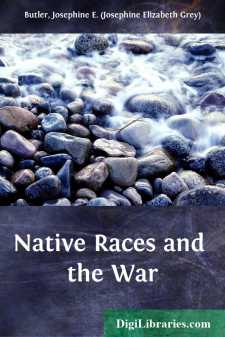Categories
- Antiques & Collectibles 13
- Architecture 36
- Art 48
- Bibles 22
- Biography & Autobiography 813
- Body, Mind & Spirit 142
- Business & Economics 28
- Children's Books 17
- Children's Fiction 14
- Computers 4
- Cooking 94
- Crafts & Hobbies 4
- Drama 346
- Education 46
- Family & Relationships 57
- Fiction 11829
- Games 19
- Gardening 17
- Health & Fitness 34
- History 1377
- House & Home 1
- Humor 147
- Juvenile Fiction 1873
- Juvenile Nonfiction 202
- Language Arts & Disciplines 88
- Law 16
- Literary Collections 686
- Literary Criticism 179
- Mathematics 13
- Medical 41
- Music 40
- Nature 179
- Non-Classifiable 1768
- Performing Arts 7
- Periodicals 1453
- Philosophy 64
- Photography 2
- Poetry 896
- Political Science 203
- Psychology 42
- Reference 154
- Religion 513
- Science 126
- Self-Help 84
- Social Science 81
- Sports & Recreation 34
- Study Aids 3
- Technology & Engineering 59
- Transportation 23
- Travel 463
- True Crime 29
Native Races and the War
Description:
Excerpt
I.
APOLOGY FOR "YET ANOTHER BOOK" ON THE SOUTH AFRICAN QUESTION. FUTURE PEACE MUST BE BASED ON JUSTICE,—TO COLOURED AS WELL AS WHITE MEN. DIFFERENCE BETWEEN LEGALIZED SLAVERY AND THE SUBJECTION OF NATIVES BY INDIVIDUALS. THE TRANSVAAL IN 1877: ITS BANKRUPTCY: ITS ANNEXATION BY GREAT BRITAIN: ITS LIBERATION FROM GREAT BRITAIN IN 1881. CONVENTION OF 1881 SIGNED AT PRETORIA. BRITISH COMMISSIONERS' AUDIENCE WITH 300 NATIVE CHIEFS. SPEECHES AND SORROWFUL PROTESTS OF THE CHIEFS. ROYAL COMMISSION APPOINTED TO TAKE EVIDENCE. EVIDENCE OF NATIVES AND OTHERS CONCERNING SLAVERY IN THE TRANSVAAL. APPEAL OF THE CHRISTIAN KING KHAMA. LETTER OF M'PLAANK, NEPHEW OF CETEWAYO. PREVALENCE OF CONTEMPT FOR THE NATIVE RACES. SYMPATHY OF A NATIVE CHIEF WITH THE SUFFERINGS OF CHRIST.
In the midst of the manifold utterances and discussions on the burning question of to-day,—the War in South Africa,—there is one side of the subject which, it seems to me, has not as yet been considered with the seriousness which it deserves,—and that is the question of Slavery, and of the treatment of the native races of South Africa. Though this question has not yet in England or on the Continent been cited as one of the direct causes of the war, I am convinced,—as are many others,—that it lies very near to the heart of the present trouble.
The object of this paper is simply to bring witnesses together who will testify to the past and present condition of the native races under British, Dutch, and Transvaal rule. These witnesses shall not be all of one nation; they shall come from different countries, and among them there shall be representatives of the native peoples themselves. I shall add little of my own to the testimony of these witnesses. But I will say, in advance, that what I desire to make plain for some sincere persons who are perplexed, is this,—that where a Government has established by Law the principle of the complete and final abolition of Slavery, and made its practice illegal for all time,—as our British Government has done,—there is hope for the native races;—there is always hope that, by an appeal to the law and to British authority, any and every wrong done to the natives, which approaches to or threatens the reintroduction of slavery, shall be redressed. The Abolition of Slavery, enacted by our Government in 1834, was the proclamation of a great principle, strong and clear, a straight line by which every enactment dealing with the question, and every act of individuals, or groups of individuals, bearing on the liberty of the natives can be measured, and any deviation from that straight line of principle can be exactly estimated and judged.
When we speak of injustice done to the natives by the South African Republics, we are apt to be met with the reproach that the English have also been guilty of cruelty to native races. This is unhappily true, and shall not be disguised in the following pages;—but mark this,—that it is true of certain individuals bearing the English name, true of groups of individuals, of certain adventurers and speculators....


